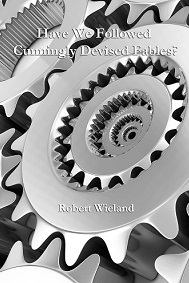29. Christ as Originator or Representative
There are a number of places in Scripture where the differences between a life source model (that reveals Christ as Begotten) and a Trinitarian model (that depicts Christ as unbegotten,[1] possessing His own resources and sharing them with the Father) become most apparent. Notice the following passages:
Isa 43:10 Ye are my witnesses, saith the LORD, and my servant whom I have chosen: that ye may know and believe me, and understand that I am he: before me there was no God formed, neither shall there be after me. I, even I, am the LORD; and beside me there is no saviour.
Isa 44:6 Thus saith the LORD the King of Israel, and his redeemer the LORD of hosts; I am the first, and I am the last; and beside me there is no God.
Isa 44:24 Thus saith the LORD, thy redeemer, and he that formed thee from the womb, I am the LORD that maketh all things; that stretcheth forth the heavens alone; that spreadeth abroad the earth by myself;
Isa 45:5,6 I am the LORD, and there is none else, there is no God beside me: I girded thee, though thou hast not known me: That they may know from the rising of the sun, and from the west, that there is none beside me. I am the LORD, and there is none else.
These passages present a challenge to both views. Each passage presents as a single individual being mentioned. The terms
“beside me there is no saviour:”
“besides me there is no God”
“spreadeth abroad the earth by myself”
“there is none beside me”
are unequivocal and isolationist, everything is excluded beyond the single individual speaking. The Bible references Father, Son and Spirit as possessing the attributes of Deity and worship of both Father and Son are directly mandated in Scripture. Whidden, Moon and Reeve reflect some of the challenges in grappling with these passages when they state concerning Isa 43:10,11
…if we are to take seriously the clear testimony of the New Testament writers that Jesus is God, is to conclude that whoever the Lord, YHWH, or Jehovah who speaks in Isaiah 43:10,11 is, His Identity must include that of Jesus of the New Testament who claimed to be in some sense the Jehovah of the Old Testament.[2] The Trinity, Page 48
This is an important point. If Jesus is not included in the passages of Isa 43:10,11; 44:6 and 45:5,6, then how can Christ’s claim to being equal with God and worshipped as God be sustained?[3] [4] On the other hand if Christ is included, how do we account for the unequivocal isolationist language? Would it not have been a lot simpler for the passages to say “There is no God besides Father, Son and Spirit in one indisolvable union”?
A. Making “I” mean “We” and “Me” mean “Us”
In respect of a Trinity model, one way to solve this problem is to make “I” mean “We”. One member of the Godhead speaks for all of them and there is in fact no differentiation between members. This is where we have three persons in one substance[5] or we have a blending of the three persons in a mysterious unity that can’t be fully comprehended.[6] The two concepts are very similar and the end result is the same: A blended indisolvable mysterious unity that allows one to speak for all without focus on who is actually speaking.
Firstly: To accept this, there must be a linguistic sacrifice: “I” nor longer means “I” in the sense of English (and Hebrew) but rather “We” and “Me” can’t mean “Me” it must mean “Us”
Secondly: There must also be a loss of importance as to which member of the Godhead is actually speaking. Could knowing who is actually speaking be important? Is there a potential through the blending process, that the individuality of each member could be lost in certain texts? I guess for some this is not an important point as they are all the same in character anyway, but for those of us that actually are interested in a personal relationship with the individual person Jesus and the individual person of the Father, it certainly is important. The difference could be akin to the receiving of the usual Christmas family letter. Usually one member of the family writes about the whole family and for some it is irrelevant who is writing as long as you get the information, but for others who know them well and are interested in more detail, they are actually interested to know who wrote the letter.
If the Isaiah texts speak only of the Father as many Non-Trinitarians claim then it does appear to make it impossible to harmonise such texts with the New Testament claims of Jesus that He is God. And it is clear that Jesus has full rights to be called God and is worshipped as God.[7]
Is there a way to read these passages simply without sacrificing linguistics or denying the full deity of Christ?
B. Power-Based Equality Causes Confusion
I believe the key lies in our understanding of the equality of Godhead members and the life source flow from the Godhead. In chapter 21 we looked at the two different measuring rods used to determine Deity. A performance based measuring system determines Deity by inherent power and unlimited existence measured by time and eternity. In a reply to me concerning my earlier draft of this manuscript it was stated “Equality of the members of the Godhead is by virtue of their possession of inherent characteristics.”[8]
This natural line of reasoning creates the underlying assumption for how we should understand Ellen White when she states that Christ has life original (from himself) and unborrowed (from any source outside himself) and underived (from any source outside himself). This interpretation of the passage is mandated by the demand that quality be based on inherent characteristics regarding life, power and existence.
This type of equality demands that there is a Divine life source that the Father possesses and a Divine life source that the Son possesses and in the equality of these possessions we see the basis of a unity from which springs love, unity and oneness. The two life sources (or three when we include the Spirit) create the natural potential for autonomous and individual action. We see the fruit of this potential in the way some Adventist Scholars view the Creation.
On His own [Speaking of Christ] He stretched out the heavens and by Himself He spread out the earth. How can anyone claim that Yahweh had a foreman (or someone similar) as a helper? There is no contradiction for those who know the truth about the Trinity. Jesus is a member of the Godhead and as such is the Creator.[9]
The author of this statement believes that Christ performed the work of creation alone. This is an explanation for Isa 44:24 and is the natural fruit of power based equality. Did Christ act alone?
Heb 1:2 Hath in these last days spoken unto us by his Son, whom he hath appointed heir of all things, by whom also he made the worlds;
The context of Heb 1:2 would indicate that the Father made the World’s by His Son. But what about the following text further on:
Heb 1:9 Thou hast loved righteousness, and hated iniquity; therefore God, even thy God, hath anointed thee with the oil of gladness above thy fellows. And, Thou, Lord, in the beginning hast laid the foundation of the earth; and the heavens are the works of thine hands:
This text reveals that the Father speaks of the Son laying the foundation of the Earth and the heavens were the work of Christ’s hands. Do Hebrews 1:2 and 1:9 Contradict? Do we change the meaning of the word “made” to mean “plan with”? Do we strip the word “made” of action?
C. Father is Source and Christ is Actuator
I contend that this apparent contradiction is created by the power equality required to deem a person of the Godhead Divine. Notice the Life source ideas in these passages:
“But turning from all lesser representations, we behold God in Jesus. Looking unto Jesus we see that it is the glory of our God to give. "I do nothing of Myself," said Christ; "the living Father hath sent Me, and I live by the Father." "I seek not Mine own glory," but the glory of Him that sent Me. John 8:28; 6:57; 8:50; 7:18. In these words is set forth the great principle which is the law of life for the universe. All things Christ received from God, but He took to give. So in the heavenly courts, in His ministry for all created beings: through the beloved Son, the Father's life flows out to all; through the Son it returns, in praise and joyous service, a tide of love, to the great Source of all. And thus through Christ the circuit of beneficence is complete, representing the character of the great Giver, the law of life.” DA 21
“God has sent his Son to communicate his own life [The Father’s Life] to humanity. Christ declares, "I live by the Father," my life and his being one. (Ellen G. White, Home Missionary, 1st June 1897, ‘A call to the work’)
As legislator, Jesus exercised the authority of God; his commands and decisions were supported by the Sovereignty of the eternal throne. The glory of the Father was revealed in the Son; Christ made manifest the character of the Father. He was so perfectly connected with God, so completely embraced in his encircling light, that he who had seen the Son, had seen the Father. His voice was as the voice of God. {RH, January 7, 1890 par. 2}
These passages from Ellen White make it clear that it is the Father’s life that flows through the Son. The Son shares the Father’s life. This fact of course makes a power-based equality impossible, but I contend that such equality concepts originated in the mind of Satan, not God.
If we allow the Father to be the source and Christ to have received all the fullness of the life, then Christ can act as representative of the Father rather than be required to be the originator of action independently. So what about the texts in Isaiah?
Isa 43:10,11 Ye are my witnesses, saith the LORD, and my servant whom I have chosen: that ye may know and believe me, and understand that I am he: before me there was no God formed, neither shall there be after me. I, even I, am the LORD; and beside me there is no saviour.
Christ states in John 5:19,20 that he does nothing of himself, but what he sees the Father do. And the Father shows him everything that He does and the Son follows through. In this light we see Christ as the representative of the Father speaking concerning the Father, who is the source of all things. Is Christ left out of this equation? No, because this text addresses source, not actuator. The texts of Isaiah make sense in the context of this very important passage from Ellen White
“The Lord Jesus Christ, the only begotten Son of the Father, is truly God in infinity, but not in personality.” UL 367 (1905)
Is Ellen White here saying that Jesus is not truly God? Of Course not, but she is saying he is not the source, the originator, this is the Father. Ellen Whites quote above is a reflection of what Paul says regarding Source and Actuator:
1 Co 8:6 yet for us there is one God, the Father, of whom are all things, and we for Him; and one Lord Jesus Christ, through whom are all things, and through whom we live.
The Father is presented as source – “of whom are all things” and Christ is presented as actuator – “through whom are all things”
This life source confusion is highlighted again regarding Isa 43:11 when it is claimed:
Furthermore, the case becomes even more compelling when the Lord goes on to say that “besides me there is no saviour”…it must mean that the Messiah Jesus of the New Testament is the Lord Jehovah of the Old Testament prophet Isaiah[10]
But the Scripture says:
2Co 5:19 To wit, that God was in Christ, reconciling the world unto himself, not imputing their trespasses unto them; and hath committed unto us the word of reconciliation.
This passage indicates that the Father is the Saviour, reconciling the world to himself through Christ. The Father is the Source, Christ is the Actuator.
Even the Revelation of Jesus Christ given to John was sourced from the Father. Everything finds its source in the Father. Everything that Christ does finds its source in the Father. Christ has received everything from the Father. The only reason the church rejects this is because it will not reject the false basis of equality. I state again this type of equality finds its source in the mind of Satan, not God. Satan was the one who stated that he would ascend, he would exalt his throne, he would sit upon the mount of the congregation, he would be like the most High. Clearly it is Satan who originated power based equality.
When we understand source and representative concepts, the Bible reads more plainly and simply. Take for instance the sending of the Angel to the Israelites.
Exo 23:20-23 Behold, I send an Angel before thee, to keep thee in the way, and to bring thee into the place which I have prepared. Beware of him, and obey his voice, provoke him not; for he will not pardon your transgressions: for my name is in him. But if thou shalt indeed obey his voice, and do all that I speak; then I will be an enemy unto thine enemies, and an adversary unto thine adversaries. For mine Angel shall go before thee, and bring thee in unto the Amorites, and the Hittites, and the Perizzites, and the Canaanites, the Hivites, and the Jebusites: and I will cut them off.
Christ is the one speaking here. He speaks of sending an angel and that His name is in Him. We also know that Christ is the angel mentioned.[11] Does Christ speak of Himself in another form? This makes things complicated. But if Christ is speaking as a representative of the Father and what the Father will do through His Son as the Angel that follows them, the passage is plain. We must remember that Christ speaks what He hears the Father speak and as the WORD of God, He communicates it to us.
So in the context of Life source coming from the Father all of these texts in Isaiah fall into place. These texts point to the Father as the source. Christ is not excluded as God because He shared/inherited the Father’s Life and is worshipped as God and all the fullness of the Godhead dwells in Him. All this is possible once we let go of power-based equality concepts that find their origination in Isa 14:12-14
[1] Many Trinitarians would deny that they believe Christ is unbegotten. Many see Christ as spiritually begotten to be a Son for the purposes of the gospel while others see Christ as begotten in the incarnation. In either case, this is not a true state of being begotten. To be spiritually begotten is like saying you believe in the rest of the Sabbath without the need for keeping the weekly Sabbath. It is only something spiritual.
[2] Whidden, Moon and Reeve, The Trinity, Page 48
[3] Phil 2:6; Matt 28:17; John 5:18
[4] It is interesting to note that the Adventist Bible Commentary completely by-passes the difficulties of identification in the Isaiah passages
[5] Max Hatton Understanding the Trinity Page 133
[6] Erwin Gane, Personal Email “Here is a very mysterious relationship. There is a unity of existence between the Father and the Son which is infinitely mysterious.”
[7] Heb 1:8; Rev 5:13.
[8] Barry Harker. A Response to “The Return of Elijah” Page 7
[9] Max Hatton, Understanding the TrinityPage 63. Note the author does not deny the Father’s part in the creation, but the action of Creation was alone performed by the Son.
[10] Whidden, Moon, Reeve, 48.
[11] 1 Cor 10:4 “…for they drank of that spiritual Rock that followed them: and that Rock was Christ.” The confusion of life source by evangelicals is also a possible reason why they reject Christ being Michael the Archangel.





